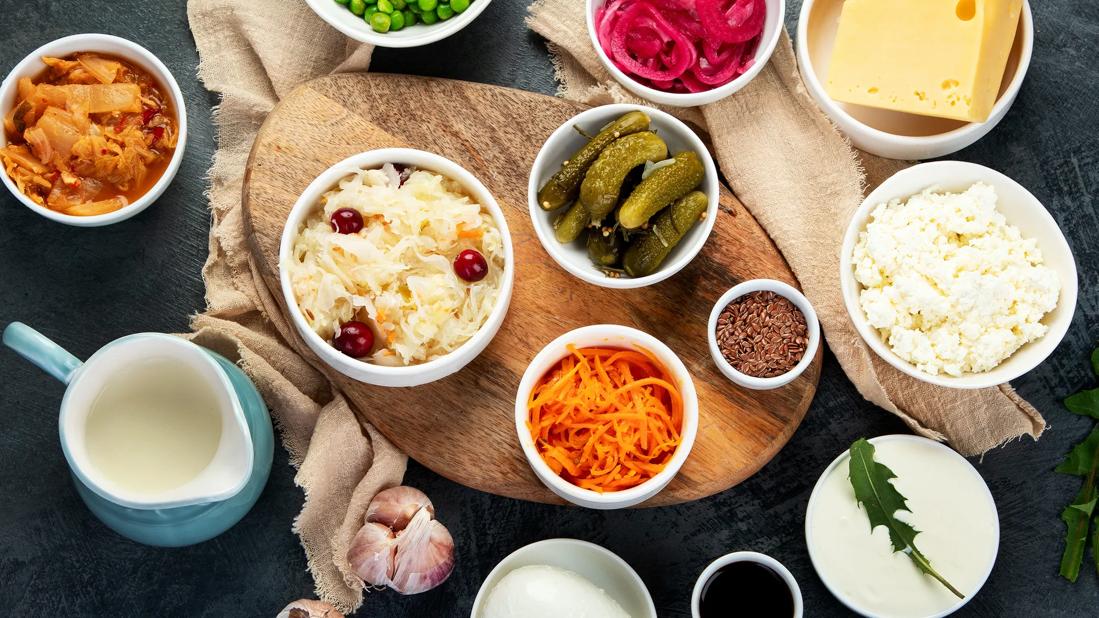Yogurt, sauerkraut, kimchi and other fermented foods are a good way to get those beneficial microbes

Image content: This image is available to view online.
View image online (https://assets.clevelandclinic.org/transform/d9935bbf-57f9-4460-828f-47007c41cef1/probiotic-foods-1359074648)
A variety of probiotic foods, like pickles, cheese and sauerkraut, are laid out on a table
When you think of probiotics (those beneficial microbes living inside your gut), you may think of all the information popping up on your social media feed about how they can improve your digestion, boost your immune system and promote your overall gut health.
Advertisement
Cleveland Clinic is a non-profit academic medical center. Advertising on our site helps support our mission. We do not endorse non-Cleveland Clinic products or services. Policy
And while you may be considering taking a probiotic supplement, did you know that you can get probiotics naturally through certain foods like yogurt, sauerkraut, miso and kimchi? Let’s take a dive into what types of probiotic foods you should eat.
Before we get started, it’s important to know that probiotic foods contain different types of healthy bacteria. Some popular strains include:
While many fermented foods contain probiotics, certain processes like pasteurization can remove the healthy bacteria that makes something probiotic.
Ready to give foods containing probiotics a try? Here’s a look at which foods have probiotics:
When it comes to foods high in probiotics, one of the best options is yogurt. It contains a variety of healthy bacteria, as well as the vast majority of probiotic species (like Lactobacillus and Bifidobacterium, two of the most popular forms).
While most yogurts will sport a “Live & Active Cultures” seal on the container, it isn’t mandatory for manufacturers to include them. Whether you’re eating traditional, flavored, Greek or nondairy yogurts, most will contain probiotics (you can check the label to make sure). A pro tip? Steer clear of options that contain high amounts of added sugar.
Advertisement
“Yogurt is very comparable to any over-the-counter probiotic supplements you may take,” says registered dietitian Maria Garcia Luis, MS, RD, LD.
This common Eastern European dish of finely shredded and fermented cabbage is chock-full of probiotics. Garcia Luis says to look for unpasteurized versions — the pasteurization process kills live bacteria.
This mixture of fermented cabbage and other vegetables (and sometimes seafood) is a popular Korean side dish. And while it tastes delicious, you’re also helping out your gut health thanks to probiotics like Lactobacillus.
This type of fermented milk contains probiotics making it a good choice if you’re looking to boost your gut health. And since it’s low in lactose, you can enjoy kefir even if you have a lactose intolerance.
When it comes to meat replacements, you may tend to think of tofu. But tempeh, a fermented soy product, also comes with plenty of benefits, including probiotics (think Lactobacillus and Bifidobacterium) to help with your digestion, immunity and overall gut health.
The popular Japanese seasoning is made with fermented soybeans, salt and koji (a fungus that gives foods an umami taste). Miso contains probiotics like Aspergillus oryzae (from the koji) and Saccharomyces cerevisiae (a type of yeast).
Kombucha, a fermented black or green tea, is often touted as a good way to get your probiotics. But Garcia Luis says consuming too much can lead to various digestive issues, such as gas and diarrhea due to the high sugar content and the fermentation process.
Other fermented vegetables are also known to contain a fair amount of probiotics. But it’s important to note that if they’re pickled in a vinegar solution, they don’t contain probiotics. Choose vegetables that have been fermented with salt and lactic acid bacteria. Options include:
And even the briny liquid in pickles and pickled vegetables is loaded with probiotics — so don’t throw away that liquid gold.
While the amount of probiotics in these foods may not be as high as yogurt or sauerkraut, it’s worth mentioning that they do contain some kind of probiotics:
While there isn’t a recommended amount of probiotic foods you need to eat each day, Garcia Luis offers the following advice on getting started:
“If you’re not used to eating some of these probiotic foods, you should start slowly by introducing one or two foods at a time,” she recommends. “Doing so can ensure you’re not developing any symptoms like diarrhea or abdominal cramping.”
Advertisement
Advertisement

Sign up for our Health Essentials emails for expert guidance on nutrition, fitness, sleep, skin care and more.
Learn more about our editorial process.
Advertisement
This fermented food can feed your gut, help manage hunger and possibly curb colon cancer risk
Probiotics are ‘good’ bacteria that help your gut, while prebiotics are foods that fuel the bacteria
Taking your probiotics in the morning with food is a great strategy — but consistency is key
There’s little evidence that probiotics cause weight loss, but having a healthy gut microbiome may set the stage for it
Maintain a healthy vaginal microbiota with the help of good bacteria
Pick bell peppers to help fight cancer, memory decline and joint pain
People with PKU need to avoid high-protein foods, like meat, dairy, legumes and whole grains
Prioritize your health by managing stress, strengthening your social connections and getting quality sleep
Bolsters, blankets, pillows and blocks can offer extra support, stability and comfort
Allergies, postnasal drip, asthma or reflux could be to blame for a cough that won’t quit